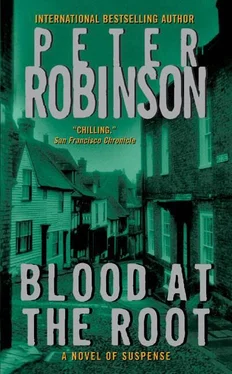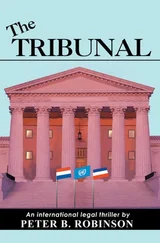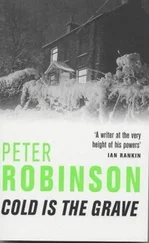Frank reminded Banks of his own father in many ways. Both had fought in the war, and neither spoke very much about it. Their racial attitudes were much the same, too. Banks’s father might complain about immigrants taking over the country, changing the world he has known all his life, making it suddenly alien and unfamiliar, threatening even. And in the same way, Frank might have let slip a remark about a tight-fisted Jew. But when it came down to it, if anyone needed help, black or Jewish, Banks’s dad would have been first in line, with Frank Hepplethwaite probably a close second.
As unacceptable as even these racial attitudes were, Banks thought, they were a hell of a long way from those held by Neville Motcombe and his like. Banks’s dad’s view, like Frank’s, was based on ignorance and anxiety, on fear of change, not on hatred. Perhaps in Motcombe’s case the hatred sprang from an initial fear, but in most people it never went that far. Just like a lot of people have bad childhoods but they don’t all become serial murderers.
The wheels bumped on the runway, and soon Banks was drifting into the arrivals hall with the crowds. He was traveling light, with only one holdall, so he didn’t have to wait at the baggage claim. The place was like a small city, bustling with commerce, complete with its shops, bank, post office and tourist-information desk. A colleague had told him a while ago that even pornography was on sale openly at Schiphol. He had neither the time nor the inclination to look for it.
The first thing Banks needed when he got off a plane alive was a cigarette. He followed the signs to the bus stop and found he had a fifteen-minute wait. Perfect. He enjoyed a leisurely smoke, then got on the bus. Soon it was speeding along the motorway under grids of electrical wires and tall street lamps.
The excitement of arrival pushed Banks’s problems into the background for the moment, and he began to take some pleasure in his rebellion, his little act of irresponsibility. So that no one would feel he had disappeared completely into thin air, he had rung Susan Gay and told her he was taking the weekend off to go to Amsterdam and should be back sometime Monday. Susan had sounded puzzled and surprised, but she had made no comment. What could she say, anyway? Banks was her boss. Now, as the bus sped toward the city center, he began to savor the coming hours, whatever they might bring. It could hardly be worse than life in Eastvale right now.
He had been to Amsterdam once before, with Sandra, one summer when they were both between college and jobs. He remembered the bicycles, canals, trams and houseboats. The place was full of leftover sixties spirit back then, and they had tried it all while they could: the Paradiso, the Milky Way, the Vondelpark, the drugs – well, marijuana, at least – as well as taking in all the museums and the tourist sights.
Stationsplein looked much the same. The air was warm, tinged only faintly with the bad-drains smell from the canals. Trams clanked about in all directions. A Perspex-covered boat set off on its canal tour. Arrows of ripples hit the stone quay.
Mixed with the late-season tourists and ordinary folk were all the post-hippie youth styles: punk spikes, a green Mohawk, studded leather vests, short bleached hair, earrings, nose rings, pierced eyebrows.
Banks found the taxi rank nearby. He would have liked to walk after being cooped up on the plane and the bus, but he hadn’t got his bearings yet. He didn’t even know how to get to the hotel, or how far it was.
The taxi was clean and the driver seemed to recognize the name of the hotel. Soon he had negotiated his way out of the square and they were heading along a broad, busy street lined with trees, arcades, shops and cafés. The pavements were crowded with tourists, even in early October, and Banks noticed that some of the cafés and restaurants had tables out on the street. He opened the window a little and the smell of fresh-brewed coffee came in. God, it was like a summer’s day.
The driver turned, crossed a picturesque bridge, then continued along one of the canals. Finally, after a few more turns, he pulled up in front of the hotel on Keizersgracht. Banks paid what seemed like an exorbitant amount of guilders for such a short trip, then hefted his holdall out of the boot.
He looked up at the unbroken row of buildings in front of him. The hotel was small and narrow, about six floors high, with a yellow sandstone facade and a gabled roof. It was wedged in a long terrace of uneven seventeenth- and eighteenth-century buildings that had once, Banks guessed, probably been merchants’ houses. Some were built of red brick, some of stone; some had been painted black or gray; some had gables, some had flat roofs. All of them seemed to have plenty of windows.
Banks dodged a couple of cyclists and walked into the hotel lobby. The man at the desk spoke good English. Banks remembered from his previous trip that most people spoke good English in Amsterdam. They had to do. After all, how many English people bothered to learn Dutch?
Yes, the man said, his room was ready, and he was delighted to be able to offer a canal view. Breakfast would be served in the ground-floor lounge between seven o’clock and nine. He was sorry that the hotel had no bar of its own, but there were plenty of fine establishments within a short walking distance. He hoped Mr. Banks would be comfortable.
When Banks pulled out his credit card, the clerk waved it away, telling him the room was fully paid for until Monday morning. Banks tried to discover who had paid for it, but the clerk became extremely coy, and his English went downhill fast. Banks gave up.
Then the clerk handed him a message: a single sheet of paper bearing a typed message that read “De Kuyper’s: 16:00hr.”
Banks asked what “De Kuyper’s” meant and was told it was a brown café – a sort of Dutch local pub – about a hundred meters to his left along the canal. It was on a quiet street corner and would probably have a few tables outside. A very nice place. He couldn’t miss it.
The room was a gabled attic up five flights of narrow stairs. When Banks got there, he was panting and beads of sweat had broken out on his forehead.
Though there was hardly room to swing a dead cat and the bed was tiny, the room was clean, with black timber beams and pale blue wallpaper. It smelled pleasantly of lemon air freshener. A blue ashtray stood on the bedside table, beside the reading light and telephone. There were also a small television set and en suite facilities.
The canal view more than made up for any inadequacies. Banks particularly liked the way the ceiling and the black-painted beams sloped down toward the gabled window, drawing the eye to its perspective. And sure enough, he looked down on Keizersgracht and the tall, elegant facades of the buildings opposite. The room was a little too warm and stuffy, so he opened the window, letting in hints of distant street sounds. He looked at his watch. Just after two. Plenty of time for a shower and a nap before the mystery meeting. But first he headed for the telephone. There was always a chance that Sandra had changed her mind.
Susan Gay was worried about Banks. Kicking her heels back in her office with black coffee and a so-very-sinful KitKat, she thought about the brief, puzzling phone call. What the hell did he think he was doing, taking a few days off in the middle of a major investigation? Just when they were getting close to tracking down Mark Wood. All right, so it was the weekend. Or almost. But didn’t he know that Jimmy Riddle would go spare if he found out? Even Superintendent Gristhorpe would be annoyed.
There had to be more to it. The way he had sounded on the phone bothered her. Abrupt. Distracted. Not like him at all.
Читать дальше












